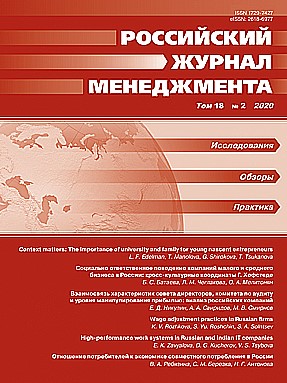Отношение потребителей к экономике совместного потребления в России
DOI:
https://doi.org/10.21638/spbu18.2020.206Аннотация
Статья посвящена изучению основных характеристик экономики совместного потребления как одного из самых быстроразвивающихся секторов индустрии 4.0 в мире и в России. В связи с возрастающей ролью потребителя как одного из ключевых экономических агентов в экономике совместного потребления фокус исследования направлен на выявление причин, по которым потребители принимают решение участвовать в экономике совместного потребления. В рамках исследования проанализированы проблемы и перспективы развития экономики совместного потребления на российском рынке, а также выявлены драйверы и барьеры, с которыми сталкиваются потребители в этой сфере, принимая решение начать пользоваться сервисами совместного потребления. Для выявления факторов, определяющих поведение потребителей экономики совместного потребления в России, проведено количественное исследование, выборка которого составила 2576 респондентов. Анализ эмпирических данных позволил выявить шесть основных факторов участия пользователей в экономике совместного потребления с позиции потребителя: (1) отношение к экономике совместного потребления, (2) сложность перехода к экономике совместного потребления, (3) воспринимаемый риск, (4) роль собственности, (5) влияние референтных групп, а также (6) гигиенические аспекты экономики совместного потребления. В результате кластерного анализа были выделены три кластера потребителей: (1) потребители, нейтрально относящиеся к экономике совместного потребления; (2) скептически настроенные потребители; (3) компетентные потребители. Полученные результаты представляют интерес как для исследователей, так и для практиков в сфере управления, так как позволяют сделать вывод о проблемах и перспективах развития экономики совместного потребления в России на основе анализа сдерживающих развитие отрасли факторов (барьеров) и стимулирующих развитие факторов (драйверов) с учетом особенностей поведения российских потребителей экономики совместного потребления.
Ключевые слова:
Экономика совместного потребления, индустрия 4.0, цифровая трансформация бизнеса, отношение потребителей
Скачивания
Библиографические ссылки
REFERENCES IN LATIN ALPHABET
Translation of references in Russian into English
Загрузки
Опубликован
Как цитировать
Выпуск
Раздел
Лицензия
Статьи журнала «Российский журнал менеджмента» находятся в открытом доступе и распространяются в соответствии с условиями Лицензионного Договора с Санкт-Петербургским государственным университетом, который бесплатно предоставляет авторам неограниченное распространение и самостоятельное архивирование.





